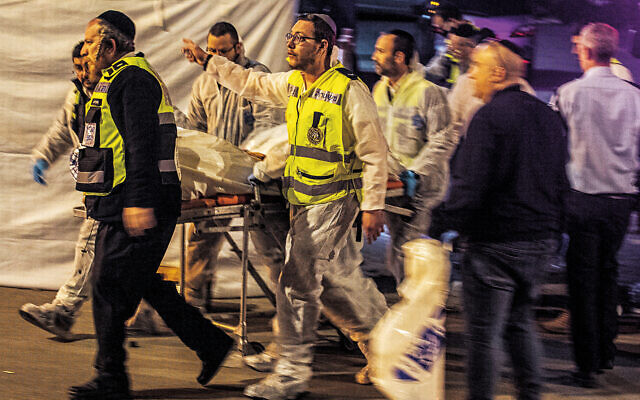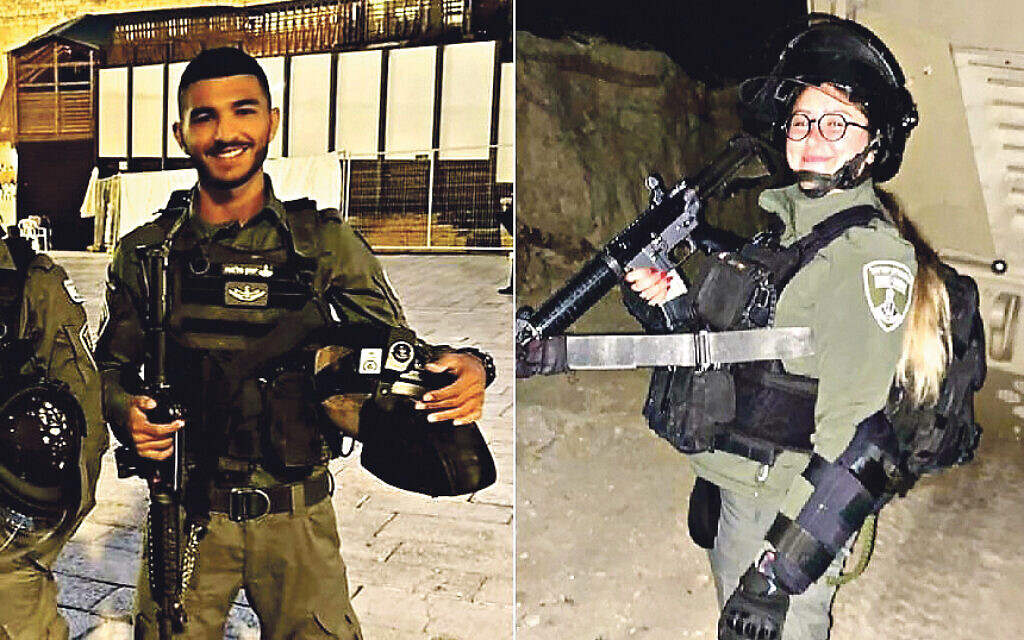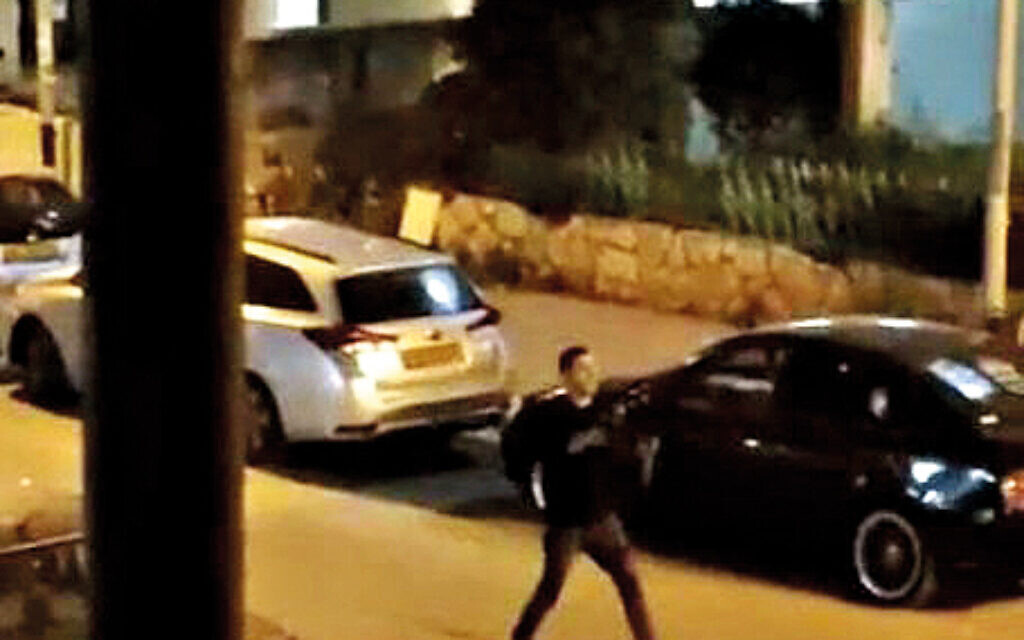Israel buries its dead as new wave of terrorism emerges
These three attacks mark one of the worst outbreaks of violence on Israel’s streets since the end of the Second Intifada 20 years ago.
Michael Daventry is Jewish News’s foreign and broadcast editor

Of all the funerals that have followed a week of terrorist attacks across Israel, Avishai Yehezkel’s was one of the most poignant.
On Tuesday evening the 29-year-old yeshiva student had been pushing his two-year-old son in his buggy in the hope of getting him to sleep.
But they were approached on the streets of Bnei Brak by a man carrying an assault rifle. Yehezkel managed to phone his brother Ovadia and warn him, then used his body to protect the toddler.
“Last night the world turned upside down,” Ovadia said on Wednesday, at Avishai’s funeral.
“You called me and said, ‘I hear shots, be careful, stay inside the house.’ And that’s it. I heard no more from you.
“You cared for us more than you cared for yourself.”
The boy survived, left alone in the street after his father was shot dead.
In all, five people were killed in the rampage across Bnei Brak, a mostly strictly-Orthodox suburb to the east of Tel Aviv.

Reports said Diaa Hamarsheh, the gunman, dismounted a motorcycle and shot at people, shouting at them in Hebrew to stop.
Another of his victims was Ya’akov Shalom, who was driving a car in the neighbourhood when he was confronted by Hamarsheh.
Also murdered were two Ukrainian nationals who had been sitting outside a shop in Bialik Street, and police officer Amir Khoury, 32, who had helped to kill the gunman.
The spree may have been inspired by earlier attacks that killed six in two other Israeli cities over the past week.
In Be’ersheva last Tuesday, a man used his car to ram a cyclist and other vehicles. He later emerged from the vehicle to stab pedestrians. A woman and three men, including a rabbi, were killed. Others suffered stab wounds.
On Sunday, two gunmen shot dead two 19-year-old police officers in the central Israeli town of Hadera. Several others were injured.

Together, the three attacks marked one of the worst outbreaks of violence on Israel’s streets since the end of the Second Intifada 20 years ago.
Prime Minister Naftali Bennett said it represented a “new wave of terrorism”.
The security establishment — Israel’s police, military and intelligence services — needed to be “creative” and adapt to a new threat, he said in a statement on Tuesday night.
He added that they must now “read the tell-tale signs of lone individuals, sometimes without organisational affiliation, and to be in control on the ground in order to thwart terrorism even before it happens”.
There was denunciation also from Mahmoud Abbas, the Palestinian president, who expressed “his condemnation of the killing of Israeli civilians tonight, emphasising that the killing of Palestinian and Israeli civilians only leads the situation to deteriorate”.
Abbas’s message was a rare intervention and reportedly came at the urging of Benny Gantz, Israel’s defence minister, who this year became the first senior Israeli politician in many years to visit him.
What was different about the incidents in Be’ersheva and Hadera was that the perpetrators were Arab citizens of Israel who had pledged fealty to the Islamic State group — an organisation that has managed to strike in Israel only infrequently.
But Hamarsheh, the Bnei Brak gunman, was a 27-year-old Palestinian from the West Bank town of Jenin. The suggestion is that his was an opportunistic copycat attack.

Gantz responded on Wednesday by deploying 1,000 troops to bolster police forces, a visible extra presence on the streets to reassure Israelis who have been shocked by the surge in violence.
Twelve additional battalions will be sent to the occupied West Bank and a further two to the border with Gaza. Israeli defence agencies, meanwhile, will work on identifying future potential copycat attacks by combing social media, disrupting attempts to exchange weapons and preventing Palestinians from entering Israel illegally.
Yet it is still not clear if the three attacks were carried out by organised terrorist groups or individuals acting alone. The Islamic State group used its propaganda networks to claim responsibility for the Be’ersheva and Hadera attacks, but Israeli authorities have not yet issued a verdict on Bnei Brak. As Jewish News went to press, no Palestinian group had claimed responsibility for the Bnei Brak shooting.
Five of Hamarsheh’s relatives had been arrested by the Israeli military in the West Bank and were being questioned on Wednesday, while multiple homes across the region were raided and searched.
Just a week ago, there was cautious hope that a more relaxed security regime could be put in place in Israel and Palestine before Passover and the Muslim holy month of Ramadan begin in April.
That is now plainly impossible.

Thank you for helping to make Jewish News the leading source of news and opinion for the UK Jewish community. Today we're asking for your invaluable help to continue putting our community first in everything we do.
For as little as £5 a month you can help sustain the vital work we do in celebrating and standing up for Jewish life in Britain.
Jewish News holds our community together and keeps us connected. Like a synagogue, it’s where people turn to feel part of something bigger. It also proudly shows the rest of Britain the vibrancy and rich culture of modern Jewish life.
You can make a quick and easy one-off or monthly contribution of £5, £10, £20 or any other sum you’re comfortable with.
100% of your donation will help us continue celebrating our community, in all its dynamic diversity...
Engaging
Being a community platform means so much more than producing a newspaper and website. One of our proudest roles is media partnering with our invaluable charities to amplify the outstanding work they do to help us all.
Celebrating
There’s no shortage of oys in the world but Jewish News takes every opportunity to celebrate the joys too, through projects like Night of Heroes, 40 Under 40 and other compelling countdowns that make the community kvell with pride.
Pioneering
In the first collaboration between media outlets from different faiths, Jewish News worked with British Muslim TV and Church Times to produce a list of young activists leading the way on interfaith understanding.
Campaigning
Royal Mail issued a stamp honouring Holocaust hero Sir Nicholas Winton after a Jewish News campaign attracted more than 100,000 backers. Jewish Newsalso produces special editions of the paper highlighting pressing issues including mental health and Holocaust remembrance.
Easy access
In an age when news is readily accessible, Jewish News provides high-quality content free online and offline, removing any financial barriers to connecting people.
Voice of our community to wider society
The Jewish News team regularly appears on TV, radio and on the pages of the national press to comment on stories about the Jewish community. Easy access to the paper on the streets of London also means Jewish News provides an invaluable window into the community for the country at large.
We hope you agree all this is worth preserving.





















